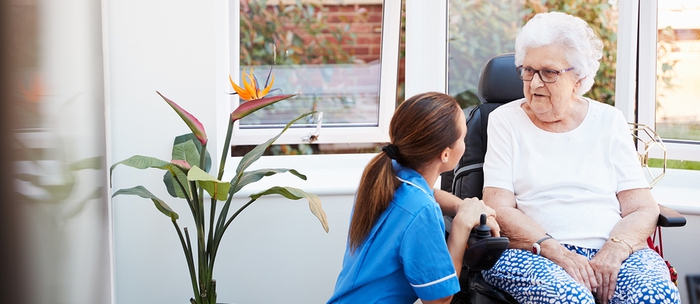
We often talk about the importance of communicating with seniors, but are there ways to facilitate this? Read on for a roundup of three tips aimed to help bridge the gap between caregivers and aging loved ones in their care.
1. Lead with empathy.
Caring for an older person isn’t always a picnic -- especially if they’re prone to being difficult. But guess what? Growing old isn’t a picnic either. Seniors suffer from many frustrating challenges, ranging from aches and pains to forgetfulness and loss of independence. The resulting crankiness and frustration can try the patience of even the most compassionate of caregivers.
Unfortunately, responding with irritation only makes the problem worse. So what makes it better? Empathy. Whenever possible, put yourself in the shoes of the older adult you’re dealing with. In a Psychology Today piece, communication expert Preston Ni recommends filtering every situation through the lens, “It must be hard….” or “It must not be easy….”
For example, if you’re aging loved one is refusing to be bathed, consider how hard it must be to no longer be able to attend to this private task without help.
2. Listen...and hear.
The life of a caregiver can be downright overwhelming. In the rush to get everything done, are you stopping to listen to what your aging loved one is saying -- and actually hearing it? Educator, author and keynote speaker Stephen R. Covey said, “Most people do not listen with the intent to understand; they listen with the intent to reply.” This is no more applicable than when it comes to caregiving. The more you commit hearing your aging loved one, the more open your lines of communication will be.
On a related note, management consultant Peter Drucker said, “The most important thing in communication is hearing what isn’t said.” This is also germane to caregiving. For a variety of reasons ranging from stroke-related aphasia to embarrassment, seniors may be unable to relate their feelings in words. In these instances, taking cues from body language and behavior can help you better understand their wants and needs.
3. Always ask.
Fear of loss of control is a troubling reality for many seniors. Caregivers unwittingly feed this fear by failing to consult with their aging loved ones whenever possible. While seniors may not have a say in certain matters -- for example, the desire to age in place when it’s no longer safe to do so -- they can maintain control over others, and giving them choices is a good way to help them feel empowered. Reinforcing this can make seniors feel more honored. Even a question as simple as, “Would you prefer eggs or pancakes for breakfast today” can be a mood-booster.

It’s also important to ask instead of assuming. Continues Ni, “Similarly, ask questions instead of making assumptions when it comes to your actions in relations to the older adult. For example, instead of turning the lights off in the senior’s room without asking, say "I’m going to turn off the lights for you, okay?" If the senior protests, let her have her way if it’s harmless, or explain why it’s important for you to do what you need to do (in most cases for the sake of senior’s health and well-being).”
One last thing to guide you in your caregiver communications with seniors? Our preferences for how people engage with us don’t change with age. While you may need to make some accommodations for physical and mental disorders when communicating with seniors, don’t patronize them or talk down to them; Rather, address them directly as you would any other adult -- and how you prefer to be addressed yourself.
mmLearn.org offers a large library of free videos for caregivers of older adults, covering topics pertaining to senior care. Whether you are a healthcare professional or a family caregiver, if you are caring for an older adult we know that you will find mmLearn.org an essential learning and guidance tool for all of your caregiver training needs. For more online training for caregivers, visit our free online caregiver video library today.
